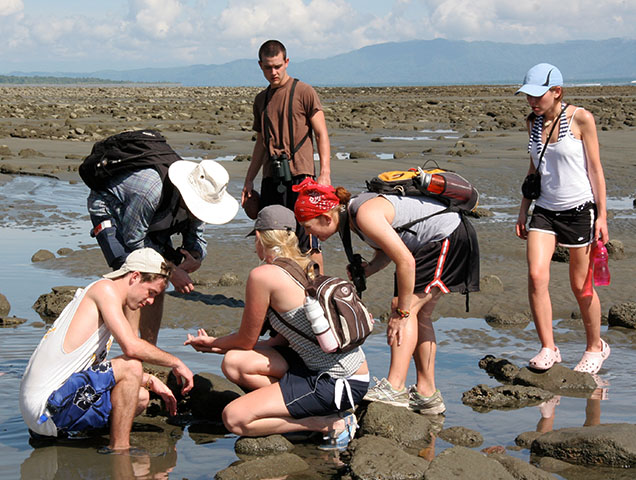Environmental Science (BS) - Environmental Management
Program Details
The Environmental Science with a concentration in Environmental Management program combines an undergraduate bachelor of science with graduate programs in the Duke University School of the Environment. Students are accepted into one of two Duke University graduate programs after completion of undergraduate coursework at Xavier: The Master of Forestry (MF) or the Master of Environmental Management (MEM). The curriculum consists of six semesters of undergraduate study at Xavier and four semesters of graduate study at Duke.
Curriculum
The sample course sequence below illustrates class offerings for the Environmental Science (BS) - Environmental Management major. Consult the official Xavier University course catalog for detailed registration and advising information.
Fall
- Biology 160: General Biology I............ 3cr.
- Biology 161: General Biology I Lab............ 1cr.
- Chemistry 160: General Chemistry I............ 3cr.
- Chemistry 161: General Chemistry I Lab............ 1cr.
- Core 100: 1st Year Seminar or Theology 111............ 3cr.
- Core 101: GOA............ 0cr.
- English 101 or 115 ENGL Comp or Rhetoric............ 3cr.
Spring
- Biology 162: General Biology II............ 3cr.
- Biology 163: General Biology II Lab............ 1cr.
- Chemistry 162: General Chemistry II............ 3cr.
- Chemistry 163: General Chemistry II Lab............ 1cr.
- Core 100: 1st Year Seminar or Theology 111............ 3cr.
- Economics 200: Microeconomics............ 3cr.
- Philosophy 100: Ethics as Intro to Philosophy............ 3cr.
Fall
- Biology 250: Ecology............ 3cr.
- Biology 251: Ecology Lab............ 1cr.
- Creative Perspectives............ 3cr.
- Mathematics 140/150: Elements of Calculus I............ 3cr.
- Second Language I............ 3cr.
- History 100s: Historical Perspectives............ 3cr.
Spring
- Biology 260: Intro to Environmental Science............ 3cr.
- Biology 261: Intro to Environmental Science Lab............ 1cr.
- Economics 320: Natural Resources Economics............ 3cr.
- English 205: Literature and the Moral Imagination............ 3cr.
- Humanities Elective............ 3cr.
- Second Language II............ 3cr.
Fall
- Biology 497 or Biology 498: Methods of Biological Research I............ 2cr.
- Biology 210: Botany............ 3cr.
- Biology 211: Botany Lab............ 2cr.
- Physics 160: College Physics I............ 3cr.
- Physics 161: College Physics I Lab............ 1cr.
- Mathematics 156/158: Statistics............ 3cr.
- Philosophy 200: Philosophical Perspectives Elective............ 3cr.
Spring
- Biology 496 or Biology 499: Methods of Biological Research II............ 2cr.
- Biology 398: ENVS Seminar............ 3cr.
- Physics 162: College Physics II............ 3cr.
- Physics 163: College Physics II Lab............ 1cr.
- Elective............ 3cr.
- Elective............ 3cr.
- Theological Perspectives Elective............ 3cr.
Sample Courses
Sample courses within the environmental management curriculum:
- Intro to Environmental Science (BIOL 260) - In this introductory course, students will examine how natural and human activities alter natural ecosystems resulting in environmental problems at both local and global scales. Students will be introduced to concepts of sustainability and solutions for current and future environmental problems that humanity will encounter.
- Environmental Studies Seminar (BIOL 398) - An environmental issue is selected and explored in depth. The seminar uses a multidisciplinary approach that analyzes the ecological, economic and ethical consequences of the problem so that students gain an appreciation for both the interconnectedness and the complexity of environmental problems.
- Professional Project (BIOL 495) - In this course, students design, carry out and communicate projects in a workplace environment, with input from workplace experts and instructor. Examples could include developing and implementing a composting plan, calculating carbon sink capacity of a park, organizing clinical or pharmaceutical data, or building and deploying science learning tools.
- Natural Resource Economics (ECON 320) - Economic analysis of managing the environment and allocating natural resources. Historical roots and ethical consequences of existing problems and policies are explored.
- General Biology (BIOL 160) - This course focuses on the interactions of molecules, cells and genetics within organisms. It lays the foundation for advanced biology courses.
Student Clubs
- Xavier Student Sustainability Club- Xavier Student Sustainability (XSS) provides students with opportunities to actively promote environmental initiatives on Xavier's campus and in the surrounding communities. Ongoing projects include move-in day recycling, office composting and educational events.
- Bird Watching Club- Students in this club observe birds surrounding the greater Cincinnati area. Members learn to identify birds by sight and sound, all while experiencing various terrestrial biomes around Xavier.
- Biology Club- The Biology Club is not exclusive to just biology majors or other related majors, but welcomes anyone and everyone who are interested biology. Past events have included hiking trips, Break Out Games, scavenger hunts and trips to the zoo and aquarium.
- Minorities in STEM Succeeding Together- Become part of a supportive community dedicated to empowering minority STEM majors. Discover a space where you can thrive, connect with peers and build confidence in your identity while pursuing excellence in STEM.
When we seek something more, we become something greater.
Find more information about how you can become a Musketeer.
Request InformationAll for One
Gain Expertise in a Program Focused on Research

Here, you'll have opportunities to research, design and implement sustainability projects for businesses and organizations. Past student projects have included developing composting plans, calculating carbon sink capacity of a park, organizing clinical or pharmaceutical data and building science learning tools.
Experience a Transformational Education

Jesuit education is deeply rooted in the promotion of social justice and solidarity with marginalized communities. At Xavier, you'll explore environmental issues through the lens of social justice, with a focus on addressing environmental injustices and advocating for equitable and sustainable solutions.
Explore Tropical Biodiversity in Costa Rica While Studying Abroad

As a student in the environmental management major at Xavier, you'll get the chance to explore tropical biodiversity, ecology and conservation in Costa Rica. Courses are conducted near the Corcovado National Park, one of the largest virgin Pacific rainforests in Central America.
Graduate With Honors
Are you looking for an academic challenge? The University Scholars Honors Program offers incoming students a more challenging curriculum and close support from professors while completing their undergraduate degree. Acceptance into the program is highly selective and includes a $2000 travel grant.
Environmental Science (BS) - Environmental Management Major at Xavier University
The Environmental Science with a concentration in Environmental Management program is designed to coordinate the education of undergraduate students at Xavier with graduate programs in the Duke University School of the Environment. Participating students are accepted into either of two Duke University degree programs: The Master of Forestry (MF) or Master of Environmental Management (MEM). The curriculum which leads to the above degrees consists of six semesters of undergraduate study at Xavier University and four semesters of graduate study at Duke University School of the Environment. During the fall semester of the junior year at Xavier, the student applies for admission to the Duke University School of the Environment. The BS Environmental Science with a concentration in Environmental Management degree will be awarded by Xavier University upon satisfactory completion of one year of full-time study at Duke University. Upon satisfactory completion of the requirements for a master's degree, Duke University will award either the degree of MF or MEM, whichever is appropriate for the student's area of concentration at Duke University. If a student is unable to enter Duke University, courses necessary for completion of requirements leading to the BS in Environmental Science can be taken during the senior year.
Xavier University’s College of Arts and Sciences challenges students to develop an integrated understanding of humanity, the world, and God by pursuing the questions raised in Xavier's core and departmental curricula. The College of Arts and Sciences is the oldest and largest college at Xavier University. The college provides an excellent liberal arts education in the Jesuit tradition that prepares students for careers, professional or graduate school, and life in a global society.
Xavier University is a private university located in Cincinnati, Ohio, providing a liberal arts education in the Jesuit Catholic tradition. Founded in 1831, the University is the sixth-oldest Catholic university in the nation. It has been ranked among the top 10 master's-level universities in the Midwest by U.S. News & World Report for the past two decades. The Princeton Review names it one of the "Best 385 Colleges in America."